#Questions and Answers on Gita Part 2
Explore tagged Tumblr posts
Text
গীতা সম্বন্ধীয় প্রশ্নোত্তর পর্ব ২
গীতা সম্বন্ধীয় প্রশ্নোত্তর | Questions and Answers on Gita Part 2 শ্রীমদ ভাগবত গীতা (Shrimad Bhagawat Gita) হল ভগবান শ্রী কৃষ্ণের মুখ নিসৃতঃ বাণী। মহাভারতের (Mahabharat) ভীষ্ম পর্বের (Bhishma Parva) অন্তর্গত ১৮তম অধ্যায়ে গৃহীত�� আমরা এই গীতা সম্বনধিত কিছু গুরুত্বপূর্ণ প্রশ্ন উত্তর (Questions and Answers on Gita) নিয়ে আলোচনা করছিলাম। এই প্রশ্ন উত্তর দুটি পর্বের মধ্যে প্রথম পর্বে আমরা জেনেছি গীতা…

View On WordPress
#GIta in bengali#questions and answers of gita#Questions and Answers on Gita#Questions and Answers on Gita Part 2#Questions and Answers on Gita Parva 1#shrimad bhagawat gita#shrimad bhawat gita#গীতা সম্বন্ধীয় প্রশ্নোত্তর পর্ব১
0 notes
Note
I LOVED the gitae fic it was so good😔🙏 We need part two where Maybe he feels pity for us and takes us out to eat or smth, you do the magic im bad at writing lmao 🤧
Thank uuu♡♡♡♡
A Planned Coincidence (pt. 1) (pt. 2)
“Where’s the fun in spoiling it? How about I show you instead?”

summary: You’ve been stuck in the same warehouse you woke up in about three weeks ago, and no matter what plan you would make to escape— it’s no use and you’d only get in trouble. One of the times you did try with Gitae around, he had to clean up after you and the topic of your friends came up and so you begged to meet them. Unfortunately, it didn’t go as planned and you ended up ignoring Gitae for days. Eventually, he decided he’d take you out in hopes you’d finally speak to him.
character(s) included: Gitae Kim x fem!reader
cw: swearing, implied kidnapping, very toxic, same warnings as my first gitae fic (part 1) , yandere gitae, mentions of blood, death, kissing, suggestive, nicknames, cartel mentions, this is FICTIONAL, abuse, mentions of drugs, guns, his axe, implied cannibalism, a bunch of crimes so beware dark and possibly disturbing content



unwrapped on: Tuesday Morning, April 30 2024
wrapped up on: Friday Evening, May 03 2024
published on: Friday Evening, May 03 2024

“You tired of playin’ these stupid fucking games yet, doll?” Gitae said in an agitated tone, as he held your bruised hand and covered it in bandages. Afterwards, he planted a light kiss on top.
You remained dead silent and only looked towards the ground of the warehouse you were trapped in. You accidentally injured yourself in another one of your escape attempts, so here Gitae was, taking "care" of you once again with some condescending mockery.
“Well? Now you’re gonna go and play the quiet game with me, huh?” He said with a slightly more irritated expression on his face.
“Look at me when i’m speaking to you.” He said and he grabbed your chin to meet eye to eye with him, and you could tell he looked angry. He tightened his grip on your already bruised hand, causing you to yelp in pain from how much pressure was applied.
“Gitae.. I-I—, I was wondering if yo—” You were trying to speak when a few rounds of open fire suddenly interrupted you. You flinched and a visibly frightened expression was evident on your face. Gitae saw this and took you into his arms to face him, while on his lap so that he could straddle you and stroke your hair.
“Sorry about the noise, little girl. Just part of my men’s duties, I’ll let them know to keep it down though,” he said in a less irritated tone.
“Back to where we left at earlier.. Why do you keep tryna fucking escape?” He said in a slightly more raised tone.
“To leave..? Isn’t the answer to that question already kind of already a given?” You replied.
“Leave?” He scoffed, “and just where exactly would a little girl like you go? If I can recall, the friends you came to Mexico have gone missing.. And technically, you’re now known as a missing person, just like your four other friends.”
“Gitae, I hate to have to ask but— Did you have anything to do with those disappearances by chance? You’re speaking as though you know all about it and from what I’ve seen in the past few days..”
He cut you off and laughed, “did I? I thought that was already a given from when I took you here, was it not?”
“I think I get it now, I’m next.. Aren’t I?” You replied.
“What? When the hell did I ever hint something even close to that? I was talking about your little friends, they’re alive, but let me just tell you now that they won’t be for very long if you keep continuing this bullshit of trying to leave me.”
“They’re alive—? Where are they?! Can I please, pleaseee see them, pretty pleaseee??” You begged with your usual pouty face.
“It’s hard to say no when you say it like that,” he said as he held your cheeks together with his hand, “if you’re good for the rest of the day, I might consider it. How’s that for a deal, doll?”
“Deal!” You exclaimed and he tapped his cheek with his finger a few times while saying, “but first~?”
You then tried to give him a kiss on the cheek but he swiftly turned his head so that your lips would land on his instead, and it worked. Despite your situation, you turned into a blushing hot mess and Gitae simply laughed at your reaction, thinking “how cute.”
A little fast forward into that same day, the sun was finally setting, so you may finally get to see your friends again. You waited patiently in the warehouse, sat on top of some boxes, reading the books Gitae gave you to pass time while he was out doing who knows what.
Some kind of bell or alarm started to ring and from what you’ve been observing in the past three weeks, that alarm means that it’s around 8 or 9 in the evening, where most of Gitae’s “men” go out to do unspeakable acts that you’ve witnessed at some point.
Usually, This was around the time you’d try escaping the warehouse because everyone was way too busy to watch over you and most of the men there have left the warehouse, getting on some sketchy vehicles with all sorts of equipment, weaponry, and drugs. The remaining people were either asleep or high in the clouds.
But when you start to see the men leave, you’d usually start to see the second batch of men arrive with Gitae. You’ve noticed a pattern where half of the men go out with Gitae during the day and the rest of the men go out during the night and what similarity both batches shared was that they all came back bloody, smelling really odd, and sometimes Gitae would bring you what he calls a souvenir,— human flesh from one of his victims. Anytime Gitae would do that, you just ignored him for the next hour or two, depending on just how much his patience is willing to endure from you being a so called “brat.”
But, it was around 8 in the evening when the bell had rang, and now it’s past midnight. Yet you haven’t seen or heard from Gitae at all.
Reluctantly, you finally resorted to asking the men around to which they only replied with stuff like, “just give him another half hour and he’ll be here. He’s probably just ran into some trouble with a gang fight or somethin like that.”
One of the men was nice enough to give you some paper that you used to make little bookmarks for the various books you had.
Gitae usually takes you to sleep with him in one of the compartments of the warehouse that led to a bedroom, but since he wasn’t here and you had no idea on how to get in there, you fell asleep on the floor beside some boxes.
You woke up the next morning when you overheard a bunch of men who sounded like they were arguing. And weirdly enough, you were on the bed in the hidden compartment of the warehouse, with Gitae fast asleep beside you. His breathing was steady and he looked tired so you decided to just look around and take mental notes of what the room looked like. It was very different from the rest of the warehouse and was pretty cozy. Gitae’s usual leather jacket was hung on a chair nearby and you noticed some of his belongings on the table. One of which, was a gun. It had you thinking if you wanted to risk your entire life, jumping off the bed to get the gun which was on his side of the room, and shoot him blank.
But that was stupid, what about all the men outside? Gitae told you he isn’t a fan of silencers on his personal guns. They’ll definitely rush over thinking that you in fact, did something— because they all know that Gitae wouldn’t dare hurt you to such a foul extent.
So, you scratched that thought and looked at the door, where does that lead? You thought to yourself. Before you could even continue thinking as you were sat up on the bed, you heard Gitae suddenly start speaking in a raspy morning voice, “what are you up to, little girl? Shouldn’t you still be asleep in my arms?” You turned over to see Gitae, with messy morning hair, not in his usual state of a few loose strands with his hair slicked back.
“Nothing, I was jus-” You stopped for a moment when you saw Gitae sit up and reach for his gun, “doll, could you riddle me this,” he said.
You nodded in response and he spoke as he loaded his gun, “did you try to escape in any form and at any time yesterday?”
He looked you dead in the eye while readjusting compartments of his gun, you lost focus and started to stare at his hands fiddling around with the gun to which he suddenly snapped his fingers, “my eyes are up here, what did I tell you yesterday?” His eyes narrowed and you responded with, “to always look you in the eye when you speak..?”
“Correct. Now, answer.” He slowly finished prepping his gun.
“I didn’t, you could ask the men out there for proof of that.” You said.
“I already did, they told me you were finding me last night? Is that true, my pretty doll?” He said as he caressed your face.
“Well, you were taking much longer than expected to arrive.. A-and you did tell me that if I was good for the rest of the day, I’d get to meet my friends..” You said hesitantly.
“Right.. About those little friends of yours,” he spoke as he placed the gun on the table and your eyes widened, “what about them..?”
“Hoho, do you wanna find out for yourself?” He said with a smirk on his face.
“Gitae.. What do you mean..?”
“Where’s the fun in spoiling it? How about I show you instead?”
“Fine then,” you replied.
Gitae stood up from the bed and so did you, it was still about 4 in the morning so it was cold outside of the bedroom, which is why Gitae put his leather jacket on you since you weren’t wearing much.
He unlocked the door with some sort of key that he took from a high shelf you couldn’t reach for yourself. Before he even swung the door open after unlocking it, he took a blindfold and placed it on you first, something that typically happens whenever you guys were going to leave the bedroom. From there he just carries you to the main open area of the warehouse to which he then takes the blindfold off once you’ve arrived around the usual boxes you stay at.
“So.. Where are they??” You asked visibly confused, tilting your head to the side as you looked up at Gitae.
“Silly girl, they aren’t here.. They’re at some other location we’ll be driving to,” he replied as he looked at one of the men who usually drove you and Gitae around. To which that man immediately left, starting up one of the cars that were outside.
“Awh, but it’s so early.. It doesn’t even look like it’s 5 in the morning, why would you suggest we go now..?” You pouted as you looked at Gitae, because of how sleepy you were he had to hold you with one of his hands to keep you from falling.
“Don’t worry, sleeping beauty— It’s a few hours to get to where they’re at, so you could just sleep on me in the meantime.” He replied as he carrier you once again and took you to the car.
He positioned you on his lap to face him and you settled your head in the crook of his neck, slowly drifting away. He gave you kisses on the top of your head and stroked your hair while you gently caressed his shoulders. You fell asleep easily and stayed in the same position.
Eventually, the car parked at some hidden area which appeared to be in a secluded part of a forest. You were still asleep when you guys arrived so Gitae started pressing kisses all over you. You started feeling ticklish from all of it and woke up.
Not even sure how you guys got here because you didn’t see a road to drive on but you didn’t question it.
“Good morning doll~ We’ve arrived, would you like to finally meet your little friends?” Gitae asked you, who was still sleepy and had woken up from a good dream, still not processing anything.
You simply nodded and clung onto Gitae’s shirtless body because you were too tired to even try getting up and walking.
Gitae carried you with ease and walked towards what appeared to be a pretty run down building, but what it specifically looked like was a blur to you because of how out of it you still were at the time.
An awful stench was evident from the exact moment you were in the building. A loud screech coming from a girl was heard all throughout the large building, echoing amongst the floors. The voice sounded a little too familiar, almost as if it were one of your friends producing a vile screech, a desperate scream for urgent help. The echo suddenly came to a stop without repeating the rest of the noise. Gitae tried to assure you that was someone else but it was no use, you were in an environment you’ve never been in before, hearing all sorts of things. You were terrified and started to both panic and cry, while you were still in Gitae’s arms. He started to get irritated with how your current state was, he even threatened to hit you if you didn’t stop screaming and crying, trying to get away from him. You ran off into some other part of the large building, hiding from him. At first, he was annoyed but decided to play your little game of hide and seek. But, couldn’t find you and so he started to punch different walls, some of which collapsed in an attempt to find you easier and to get you out.
He couldn’t take it anymore and pulled out his axe, he said that you had exactly 5 seconds to reveal yourself or this wouldn’t end well.
“This is a stupid fucking game, Y/N. 5,” he started his countdown, “4,” and you knew better than to disobey, so hesitantly “3,” you started to leave your hiding spot to reveal yourself, “2,” before he could even reach 1, you were on your knees behind him, sobbing.
“Gi-Gitae, please..” You sniffled, “I already have gotten a good idea of what you did with them, so please.. I don’t need to see it for myself.”
He scoffed, “after you just ran and hid from me? Yeah, I don’t fucking think so.” He grabbed you by your hair harshly and dragged you to the basement floor. And that’s where you saw another nightmare right in front of you, from the scene of the group of men who attacked you, to your own closest friends, all dead.
Except one of them, she was your closest friend in the entire group and she was completely unharmed. But had to closely witness all that was done to the other girls. She was tied up with chains and from what you know, her voice was the noise you heard earlier.
Which had you wondering, why did her screaming suddenly stop? But instead of focusing on that, you looked over to Gitae who has never looked so angry before. His grip on your hair was only becoming tighter as you tried pleading with him.
You were terrified to know that in any second, Gitae could literally crush your skull with his bare hands if he wanted to, but he didn’t. Gitae suddenly let go of the grasp he had on your hair and looked down on you, “I’m letting you know in advance that what happens next is thanks to you being such a brat.” He then struck his axe at your friend, multiple agonizing times while the one man that was there forced you to watch, holding you at gunpoint and purposely turning your head in the direction of both Gitae and your friend.
Gitae looked back at you after he struck your friend with his axe so many times that she’s no longer recognizable, you were a sobbing, pitiful, and distressed mess. You were screaming at him, begging him to stop, all the while trying to break free from the man’s harsh grip on you but it was no use and you couldn’t do anything at all.
I won’t go into too many details but it was extremely gruesome and gut wrenching. By the time Gitae finally decided he was finished, he threw the axe at your direction, purposely missing by just an inch to slightly scar your neck (since you were moving around a lot, it just barely scraped the side of your neck).
You yelped, Gitae then took a part of her flesh, and bit it— but unlike the last time, he ate this entirely and licked his fingers clean. He then spoke out “clean this place up, (insert name of man who was holding you).” To which the guy nodded and finally let go of you, you fell immediately to the ground and continued sobbing, you were twitching at this point from how terrified you were.
Gitae then looked over to you, he’s seen you upset but he’s never seen you this upset before. He looked back at the girl he had just mauled and at the other girls that were laying dead on the floor. That’s weird, he was starting to feel— bad for you?
Gitae spoke with someone on the phone and after, he carried you to the car. You never stopped sobbing and you were trembling as Gitae had you on his lap, facing his blood scattered face and body. He was trying his best to comfort you but you were ignoring him. Eventually, the car started to move and you knew this was gonna be a long ride, but you just kept on sniffing while your head was nestled in between the crook of his neck. He took the hint that you really weren’t gonna talk to him at all, so he stroked your hair with his unstained hand while you silently sobbed, clinging onto him so tightly that it left marks on his body. He also bandaged up the tiny scar you got coming from his axe.
A few days had passed and you still hadn’t spoken to Gitae no matter how many times he tried or how much he threatened you.
He was fed up, but he had an idea that might just work. He decided he’d take you out for dinner at one of the places that had gambling addicts so no staff would care. He hadn’t told you all about his plan yet but he had some guy book a reservation and he went out to buy you a little gift. You didn’t know of any of this because you couldn’t understand Spanish so you were just reading books in the corner.
He went out to buy you some clothes that he was badly hoping you’d like. He bought you more sleepwear and a cute outfit that you could wear on your little date with him. He bought some more things you mentioned you like, like some more books he knows nothing about.
He arrived back at the warehouse at around 5:30 in the evening and asked you to come with him, he blindfolded you and brought you to a bathroom. It was much nicer than the usual bathroom and you were assuming that this was another compartment of the warehouse.
He told you to shower, and you nodded in response. But, he was just standing at the doorway, staring at you. So you just stood there.
“Well?” He rose a brow, “I thought you wanted a shower, what are you doing just standing there?”
You gulped and finally spoke for the first time in days, “d-do you really.. have to watch..?”
He looked you up and down, “either I watch or join you, take your pick.” You remained silent, you didn’t want either of that.
He scoffed and put the blindfold on you once again, you could hear him fiddling with his belt and clothes rustling. After, he started to undress you as well, disposing of your clothes in the trash.
He turned on the running water in the bathtub and while it filled, he was doing some things but you couldn’t see so you had no idea. He took you into his arms and the next thing you felt was pure water, you haven’t showered in a while so this was a bliss. He took your blindfold off and to your surprise, you were on top of him in the bathtub. He gently sunk you into the water, and laid you on his figure, showering your hair with water.
He then applied different products on your hair and massaged your scalp. after he finished washing your hair and body, he started fondling around with your body.
“Your skin is so soft, doll,” he said as he played with your boobs. You lightly moaned from what he was doing and he smirked, “you like that, don’t you?” You subconsciously bucked your hips in response which caused him to twitch down there. You could feel his dick on you and he started aggressively kissing you. Things escalated and you ended up having to take a second bath.
“Doll~, I forgot to mention it because you riled me up so much earlier that I lost the chance to— butt, we’re going out tonight and I bought you some clothes.” Gitae said as he took out some unfamiliar clothes from the shelf and started to dress you while he was still in a towel.
After you were fully dressed, he smiled at you and commented, “you look adorable, just like a doll.”
Afterwards, he got dressed and was finally wearing something other than just jeans. He was wearing black pants and a formal shirt. You thought he looked handsome in his outfit so you commented, “you look handsome, Gitae,” you giggled. He chuckled and planted light kisses on the top of your head.
You guys then went out and arrived at some nice and flashy building. It was weird at first, you couldn’t possibly fathom why he would do this. Either way, you just went it.
“Well?” Gitae suddenly spoke as you were sat across from him, in a nice restaurant.
“Thank you,” you replied as you looked around the secluded spot you guys were sat at.
Gitae sighed, “still not happy?” He frowned.
You simply looked at him, pouting. To which he pouted back at you mockingly.
The food eventually arrived and Gitae wanted you to try some of his rare practically live ass steak, so he fed you some of it with his fork. You made a dissatisfied face and he laughed at your reaction. He loves the way you react to absolutely anything, he finds it adorably irresistible.
“Thank you,” you said as you were about halfway done with your meal.
“I don’t care for words, you silly little girl. How about you just show me your appreciation after dinner?” He said with a smirk.
You didn’t take the hint and so you asked, “how?”
He laughed at your response, “I’ll give you a better idea once we’re in the car, and once were back in bed, you continue wherever we left off in the car.” Your eyes narrowed until you finally understood what he meant to which you looked at him with a pout while you were chewing your food.
“What kinds of food do you like?” Gitae suddenly asked as he looked at your food then at you.
You shrugged, “I’m not really picky, but I do have my preferences and dislikes.. For instance, that steak you’re eating or any sort of steak.”
He looked at his food, “it’s delicious, how could you not like it?”
“We have wayyyy different diets, I’ve seen you eat raw meats of all sorts you bastard.”
“Awh, how am I bastard?” He pouted, but deep inside he was amused and enjoying this.
“Because of your question about food! I suddenly had a flashback about my friend, whom you took a bite of!” You said, somewhat sarcastically because you know how moody Gitae is and you didn’t want him to get angry at you again.
He just laughed, “I remember that, she tasted alright too, I should’ve had seconds.” You rolled your eyes and he was only more amused and said, “but because of your whining and puffy eyes, I had no choice but to leave as soon as I finished the job. Such a pity.”
“Hey, would it kill you to have some remorse?” You said as you picked up some meat with your fork and lifted it up to his mouth.
“I don’t really like this, but it seems like something you’d like.” You said as he was chewing what you just gave him. He would never admit it, but you feeding him made him feel something.
“It tastes good, I thought you said you weren’t a picky eater?”
“I’m not,” you said as you grabbed more of that meat on your fork and fed a bunch of it to him. He was genuinely so happy inside and his amusement turned into butterflies because for once, you weren’t scared of him and he for some reason, cared about that pretty badly.
Your guys’ dinner date went on like normal, exchanging words and actually getting to know each other.
Eventually you felt the need to use the restroom so you mustered up the courage to ask permission to go.
“Gitae,” he turned his gaze over to you and mumbled in response.
“Could I use the women’s room, please?”
Gitae looked around, “I’m trusting you don’t need me to make sure that no stupid attempts of leaving will happen?” He asked sternly.
“Yes, I promise.”
“Fine then, go ahead but don’t take too long.” You nodded in response and excused yourself from the table.
And just as you said, you did go to the women’s room. And just as you promised, you came back right after. While you were making your way back to the table, you saw that Gitae was approached by two guys who he seemed to have known from somewhere.
You got back to the table and the two men that Gitae was talking to looked over to you. They looked to have been working in the casino area of the building.
One of them turned back to Gitae and said, “I see now why a guy like you is brought to a place like this. I’m guessing she’s your girlfriend, right?” You all looked at Gitae who replied with a smile, “yes, she is.”
“Damn, you’re one lucky guy. She’s gorgeous from top to bottom!” One of the guys exclaimed as he placed his hand on your shoulder, rubbing it intensely. Gitae stared at his hand then at him.
How dare he lay his hand on something I own? He’ll pay for even daring to look at what clearly isn’t his. Gitae thought to himself.
“Well, we’ve gotta get going now.. But you two enjoy your night, especially the pretty lady over here,” one of the guys said as he stroked your hair and then proceeded to walk away.
You turned over to Gitae who looked like his veins were popping out of his skull and his aura seemed to have changed. He then looked back at you and smiled, “don’t mind them, I’ll make sure to deal with them some other time. But not tonight, tonight’s supposed to be our night.” He tried to keep his composure.
“Right.. Who were they anyway? And must they be so touchy..?”
“They’re friends with some of the people I know, but they won’t be for long.” He said as he took the final bite of his food and placed his fork down.
It’s safe to say that those two were never seen again, and the police didn’t even open an investigation about the disappearances when it happened. Soon, the news about those two guys went cold and if anything, any trace or information of them was wiped out entirely.



notes: I did more than the request and added way more before the actual dinner date because im gonna be busy in the next few weeks so idk when I can post again, and because i have a bunch of Gitae requests, I thought I might as well and this is long asf, also i’ve got another gitae fic in progress 😭😭
- With or without proper credits, please don't try to steal or claim any of my works as your own
I genuinely appreciate opinions, feedback, likes, and reblogs
Once again, I hope this isn't too bad for a request, and l'Il be doing more characters in lookism so feel free to request!!


#lookism#lookism fic#lookism manwha#manwha#webtoon#anime lookism#lookism anime#lookism fandom#lookism imagines#lookism webtoon#Gitae Kim#kim gitae#yandere gitae kim#gitae lookism#lookism gitae#gitae kim x reader#lookism gitae kim#lookism gitae kim x reader#lookism x reader#suggestive#lookism spoilers#webtoon lookism#manwha lookism#gitae kim x reader lookism#gitae kim lookism#foryou#foryoupage#fyp#unreleasedwrites#dark
365 notes
·
View notes
Text
Guru Dakshinamurthy is a highly revered aspect of Lord Shiva as the supreme teacher (Adi Guru) of wisdom, silence, and self-realization. He is often depicted seated under a banyan tree, imparting knowledge to his disciples, who are often the 4 kumaras.
Dakshinamoorthy’s Relationship with Lord Shiva
- Dakshinamurthy is considered a manifestation of Shiva himself, representing the guru form who imparts the truth of agamas.
- He is facing south (Dakshina), symbolizing the transmission of divine knowledge the to seekers.
- In the Guru Gita (part of Skanda Purana), Shiva tells Parvati that Dakshinamoorthy is his own form as the primordial teacher.
Origin & Presence in South India
- Dakshinamoorthy is not "born in the human sense but is an eternal form of Shiva, appearing in the Dakshina (Southern) direction.
- He is particularly worshipped in South Indian temples, especially in Tamil Nadu, Kerala, and Karnataka, where he is the presiding deity in many Shiva temples' south-facing niches.
Disciples of Dakshinamoorthy
- The four Kumaras (Sanaka, Sanandana, Sanatana, Sanatkumara), the mind-born sons of Brahma, are his primary disciples.
- Symbolically, any sincere seeker of truth is considered his disciple when they receive his grace.
How to Become His Disciple & Serve Him?
1. Seek Knowledge (Jnana Yoga) – Have Quest for True Knowledge. Dakshinamurthy blesses those who pursue knowledge of the reality.
2. Meditation & Silence (Mouna Vrata) – The 4 kumaras kept on asking questions even after they got answers. So he showed the chin mudra in hand. The index finger must go behind the thumb. The other three fingers are not touched. The kumaras understood that they must do the service to the Lord and not keep asking questions. So He is also considered as Mouna Guru.
3. Worship in Temples – Offer prayers, light ghee lamps, and chant his mantras (Dakshinamoorthy Ashtakam).
4. Serve a Living Guru – Dakshinamoorthy’s grace flows through true gurus; serving them is serving him.
5. Study Scriptures – Delve into scriptures with the intent of understanding and validating if you find it relevant.
Priest’s Perspective on Worship
- Priests in South Indian temples perform special **poojas (like Guru Purnima)** to Dakshinamoorthy.
- They believe that sincere devotion to him removes ignorance and grants illumination.
- Guru Dakshinamoorthy likes disciples who uphold dharma(constant remembrance of Lord Shiva), teaching others, and living a disciplined spiritual life.
0 notes
Text
100-Hour Yoga Teacher Training Course in Rishikesh
Rishikesh, often called the "Yoga Capital of the World," is a destination where thousands of yoga enthusiasts come every year to deepen their practice and gain authentic knowledge. If you're looking to immerse yourself in the ancient practices of yoga, a 100-Hour Yoga Teacher Training Course in Rishikesh might be the perfect place to start. This foundational training is ideal for beginners, enthusiasts, and even experienced practitioners who wish to explore the fundamentals and improve their personal practice in an immersive, serene environment.
In this blog post, we'll cover everything you need to know about 100-hour yoga teacher training in Rishikesh, the benefits, what to expect, and answer some frequently asked questions to help you decide if this journey is right for you.
Why Choose a 100-Hour Yoga Teacher Training Course?
A 100-hour yoga teacher training course is a condensed version of the longer, 200-hour training programs typically required for official certification. It provides a foundation for understanding the basics of yoga, both in theory and practice, making it a great starting point for anyone interested in yoga but not yet ready to commit to a full 200-hour program.
Some benefits of starting with a 100-hour course include:
Flexibility: A 100-hour course is usually shorter and more manageable for those with limited time. It's typically completed in two weeks.
Deepening Personal Practice: Perfect for students who want to deepen their practice and understanding of yoga without intending to teach right away.
Gateway to Advanced Training: Completing a 100-hour course often provides a foundation that makes transitioning to a 200-hour program easier.
Why Rishikesh for Yoga Teacher Training?
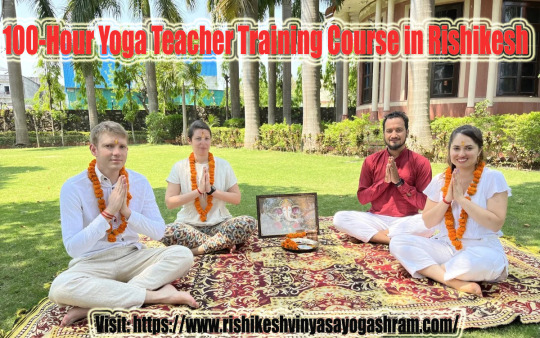
Rishikesh holds immense spiritual significance, as it is nestled in the foothills of the Himalayas and on the banks of the sacred Ganges River. The area is known for its serene atmosphere, ancient ashrams, and rich yogic tradition that dates back thousands of years.
Some reasons to choose Rishikesh for yoga teacher training include:
Authentic Experience: Learn from experienced teachers in a location where yoga was born and practiced by sages and seers.
Natural Environment: The lush mountains and riverside setting provide a peaceful, natural environment ideal for reflection and meditation.
Community of Like-Minded Individuals: Training in Rishikesh allows you to connect with others who share your passion, forming a supportive community that enhances your learning experience.
What to Expect from a 100-Hour Yoga Teacher Training Course in Rishikesh
A 100-hour course is usually packed with intensive yoga practice, theoretical study, and spiritual exploration. Here are some common aspects of what you might expect:
1. Daily Yoga Practice
Expect to start each day with a rigorous yoga session. The training usually covers a variety of yoga styles, including Hatha, Vinyasa, and Ashtanga. These sessions are designed to help you build strength, flexibility, and mental focus.
2. Study of Yoga Philosophy
The study of ancient texts like the Yoga Sutras and the Bhagavad Gita forms an essential part of the course. This helps you understand the origins of yoga and its true purpose beyond physical exercise.
3. Pranayama and Meditation
Breathwork (Pranayama) and meditation are key components of yoga training in Rishikesh. These practices help cultivate mindfulness, increase awareness, and enhance mental clarity, all of which are crucial to a balanced yoga practice.
4. Alignment and Anatomy
Learning the proper alignment of poses and understanding the basic anatomy related to yoga ensures that you practice safely and effectively. This part of the training is especially valuable if you plan to continue into a 200-hour course or eventually teach yoga.
5. Mantra Chanting and Kirtan
Many 100-hour yoga courses in Rishikesh include chanting and kirtan sessions. These are forms of devotion through sound and song, which add a spiritual dimension to the training and help you connect with your inner self.
6. Lifestyle and Diet Guidance
Yoga training in Rishikesh often includes guidance on adopting a yogic lifestyle, which may include recommendations on diet, daily routines, and ethics.
Benefits of a 100-Hour Yoga Teacher Training Course in Rishikesh
Developing a Solid Foundation: This training provides a thorough introduction to the essential aspects of yoga, making it ideal for beginners.
Boosting Physical and Mental Health: Daily yoga practice, meditation, and proper diet improve physical health and promote mental well-being.
Spiritual Growth: Practicing in a spiritual environment helps cultivate inner peace and self-awareness.
Opportunity to Continue Training: The 100-hour course can be a stepping stone to more advanced programs, like the 200-hour Yoga Teacher Training Course.
Choosing the Right Yoga School in Rishikesh
When selecting a yoga school, look for a reputable institution with qualified instructors, positive reviews, and a supportive environment. Ensure the school is registered with Yoga Alliance, as this is a mark of credibility and quality. This will be particularly valuable if you plan to pursue a career in teaching yoga.
Some well-known schools in Rishikesh include:
Parmarth Niketan: Known for its ashram-style environment and experienced instructors.
Sivananda Ashram: One of the oldest yoga ashrams with a focus on traditional practices.
Rishikul Yogshala: Offers modern facilities with a strong emphasis on authentic yogic teachings.
Tips for Preparing for Your 100-Hour Yoga Teacher Training in Rishikesh
Start Practicing Yoga Regularly: This helps build endurance and familiarity with common poses.
Bring the Right Gear: Yoga mats, comfortable clothing, and a journal are essential.
Embrace the Experience: Approach the training with an open mind and a willingness to learn.
FAQs: 100-Hour Yoga Teacher Training Course in Rishikesh
1. Who is a 100-hour yoga teacher training course suitable for?
A 100-hour course is ideal for beginners and those looking to deepen their practice without committing to a longer program. It’s also suitable for those who want a retreat-like experience focusing on personal growth and learning.
2. Can I teach yoga after completing a 100-hour course?
Generally, a 100-hour course does not qualify you to teach yoga independently. It serves as a foundation, and you would need to complete a 200-hour course to become a certified yoga instructor.
3. What is the cost of a 100-hour yoga teacher training in Rishikesh?
The cost varies by school and amenities, but generally, it ranges from $500 to $1,200. This often includes accommodation and meals.
4. Is the 100-hour course recognized by Yoga Alliance?
Most 100-hour courses are part of a 200-hour Yoga Alliance-certified course. You may need to complete the additional 100 hours to obtain a Yoga Alliance certification.
5. What should I bring to Rishikesh for the training?
It’s recommended to bring a yoga mat, comfortable clothing, personal toiletries, and a journal. Some schools may provide mats and other necessary items.
6. How can I prepare myself physically and mentally for the training?
Practicing yoga regularly before your course, staying physically active, and maintaining a balanced diet can help you prepare for the intensive schedule. Additionally, adopting a mindset of openness and patience can greatly enhance your experience.
Conclusion
Embarking on a 100-Hour Yoga Teacher Training Course in Rishikesh is a life-enhancing journey, especially for those passionate about yoga and personal growth. It’s an opportunity to immerse yourself in a yogic lifestyle, learn from seasoned instructors, and experience the serene environment of Rishikesh.
Whether you plan to eventually teach yoga or simply want to deepen your practice, the 100-hour course provides a solid foundation that you can build upon. With the right preparation and mindset, this training could be the beginning of a fulfilling, lifelong journey into the world of yoga.
#100-Hour Yoga Teacher Training Course in Rishikesh#100 hour yoga teacher training course in rishikesh price#100 hour yoga teacher training course in rishikesh
0 notes
Text
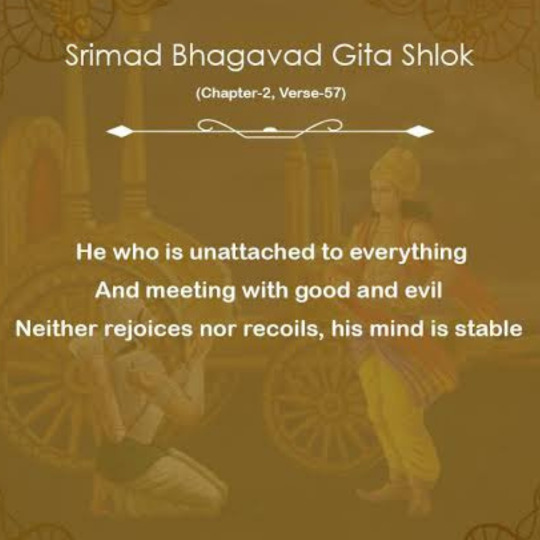
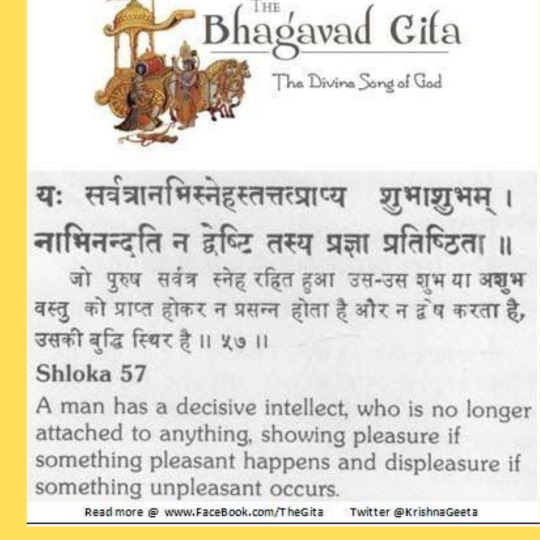
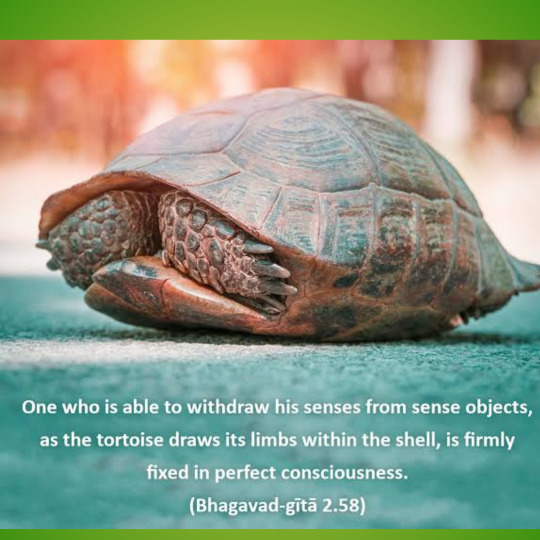
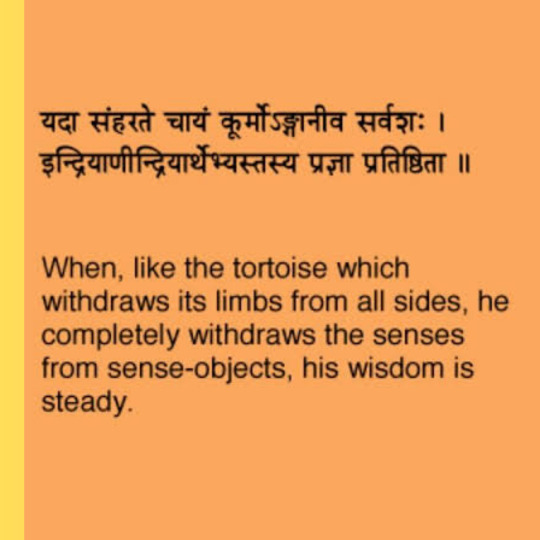
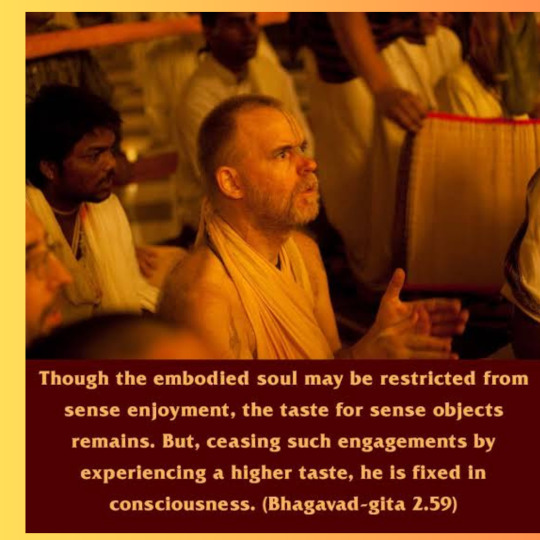
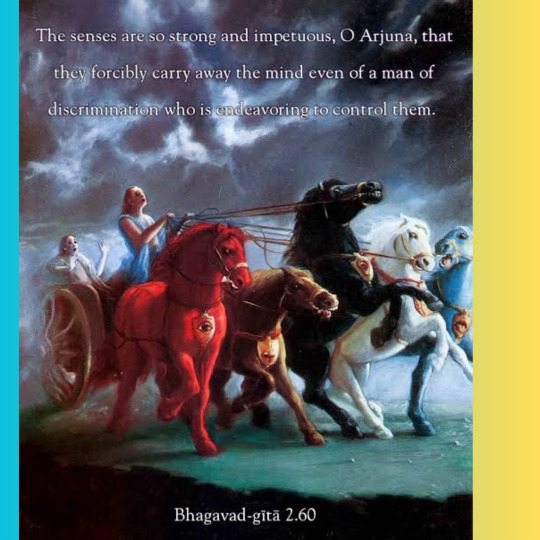
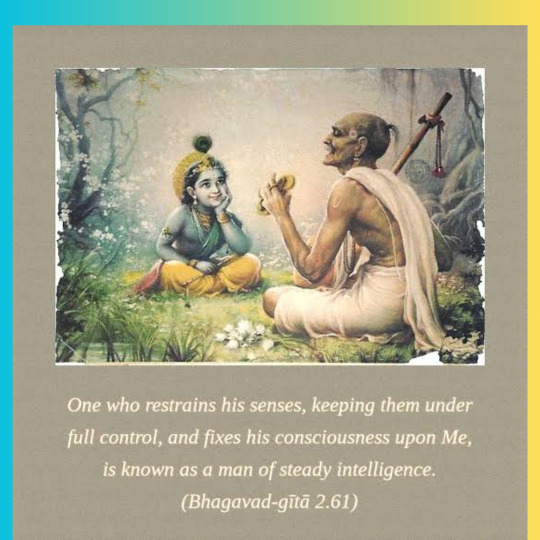

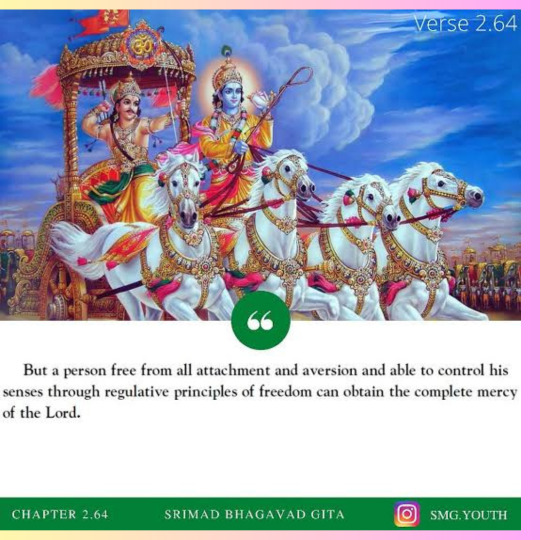
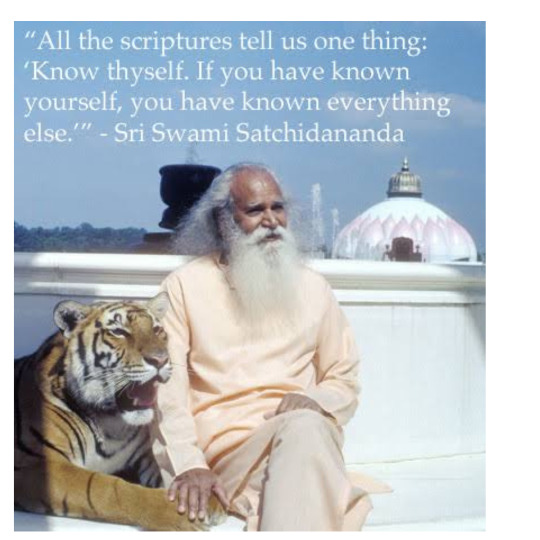
The Bhagavad Gita Chapter 2— the Spiritual Father vs the patriarchal father
different traditional translated quotes for Bhagavad Gita ch2 v57-64 (rest to follow in part 3).
———
When Krishna answers Arjuna's question-everything he describes of going after outer appearances & the senses, leading to delusion & ultimate ruin & devastation as a result of anger— is the hallmark of mistaken identity- & is a description of patriarchy, the patriarchal father, & the immature state of Consciousness, of the masculine principle.
Although the Gita was written well into the patriarchal age- therefore the context of a battle— it retains the message of the purpose of acting in the world to be devotion & service- to the beloved- & not for self-gain or material reasons in itself.
#consciousness#spiritual#presence#heart#awareness#nonduality#spirituality#divinemother#selfrealization#advaita#bhagavad gita#devotion#patriarchy
0 notes
Text
The Q&A in the Scripture: Part 2
Namaste And welcome to Part 2 of The Q&A in the Scripture series in which we are looking at the answers given by Krishna to a list of questions asked by his cousin Uddhava in a scripture called the Uddhava Gita. Remember the scene? Uddhava has asked Krishna a pile of questions about how to live a good life, how to live in the world with discernment. These questions have become urgent because…

View On WordPress
#&039;spiritual practice#absolute reality#Advaita Vedanta#authenticiy#blogging#blogging spirituality#contemplation#contemplative#Contemplative Living#emotions#gita#god#krishna#mind#mind control#Self Enquiry#self realisation#self-control#self-restraint#spiritual#spiritual journey#spirituality#The Divine#uddhava gita#universal consciousness#Vedanta#vedas
0 notes
Text
Divinum Pacis’s Reference Guide- UPDATED 2021
Let’s face it, schooling is expensive, and you can’t cram everything you want to know into 4+ years. It takes a lifetime (and then some). So if you’re like me and want to learn more, here’s an organized list of some books I find particularly insightful and enjoyable. NEW ADDITIONS are listed first under their respective sections. If you have any recommendations, send them in!
African Religions 🌍
African Myths & Tales: Epic Tales by Dr. Kwadwo Osei-Nyame Jnr
The Ancient Egyptian Book of the Dead: Prayers, Incantations, and Other Texts from the Book of the Dead by E.A. Wallis Budge
Prayer in the Religious Traditions of Africa by Aylward Shorter (a bit dated but sentimental)
The Holy Piby: The Black Man’s Bible by Shepherd Robert Athlyi Rogers
The Altar of My Soul: The Living Traditions of Santeria by Marta Moreno Vega (autobiography of an Afro-Puerto Rican Santeria priestess)
African Religions: A Very Short Introduction by Jacob K. Olupona
Buddhism ☸
The Heart of the Buddha's Teaching: Transforming Suffering into Peace, Joy, and Liberation by Thich Nhat Hanh
The Dhammapada by Eknath Easwaran (collection of Buddha’s sayings)
Liquid Life: Abortion and Buddhism in Japan by William R. LaFleur
The Tibetan Book of the Dead by John Baldock (the texts explained and illustrated)
Teachings of the Buddha by Jack Kornfield (lovely selection of Buddhist verses and stories)
Understanding Buddhism by Perry Schmidt-Leukel (great introductory text)
Essential Tibetan Buddhism by Robert Thurman (collection of select chants, prayers, and rituals in Tibetan traditions)
Christianity ✝️
The Story of Christianity Volume 1: The Early Church to the Dawn of the Reformation by Justo L. Gonzales
The Story of Christianity Volume 2: The Reformation to Present Day by Justo L. Gonzales
By Heart: Conversations with Martin Luther's Small Catechism by R. Guy Erwin, etc.
Introducing the New Testament by Mark Allen Powell
Who’s Who in the Bible by Jean-Pierre Isbouts (really cool book, thick with history, both Biblical and otherwise)
Synopsis of the Four Gospels (RSV) by Kurt Aland (shows the four NT gospels side by side, verse by verse for easy textual comparison)
Behold Your Mother by Tim Staples (Catholic approach to the Virgin Mary)
Mother of God: A History of the Virgin Mary by Miri Rubin (anthropological and historical text)
Systematic Theology by Thomas P. Rausch
Orthodox Dogmatic Theology by Fr. Michael Romazansky (Eastern Orthodox Christianity)
Diary of Saint Maria Faustina Kowalska (very spiritual)
The Names of God by George W. Knight (goes through every name and reference to the Father, Son, and Holy Spirit in the Bible)
Icons and Saints of the Eastern Orthodox Church by Alfredo Tradigo (for those who like art history AND religion)
The Orthodox Veneration of the Mother of God by St. John Maximovitch (the Orthodox approach to the Virgin Mary)
East Asian Religions ☯️
Shinto: A History by Helen Hardacre
Tao Te Ching by Chad Hansen (a beautiful, illustrated translation)
The Analects by Confucius
Tao Te Ching by Stephen Mitchell
Shinto: The Kami Way by Sokyo Ono (introductory text)
Understanding Chinese Religions by Joachim Gentz (discusses the history and development of Taoism, Confucianism, and Buddhism in China)
Taoism: An Essential Guide by Eva Wong (pretty much everything you need to know on Taoism)
European (various)
Iliad & Odyssey by Homer, Samuel Butler, et al.
Tales of King Arthur & The Knights of the Round Table by Thomas Malory, Aubrey Beardsley, et al.
Early Irish Myths and Sagas by Jeffrey Gantz
The Prose Edda: Norse Mythology by Snorri Sturluson and Jesse L. Byock
Mythology by Edith Hamilton (covers Greek, Roman, & Norse mythology)
The Nature of the Gods by Cicero
Dictionary of Mythology by Bergen Evans
Gnosticism, Mysticism, & Esotericism
The Gnostic Gospels: Including the Gospel of Thomas, the Gospel of Mary Magdalene (Sacred Texts) by Alan Jacobs and Vrej Nersessian
The Kybalion by the Three Initiates (Hermeticism)
The Freemasons: The Ancient Brotherhood Revealed by Michael Johnstone
Alchemy & Mysticism by Alexander Roob (Art and symbolism in Hermeticism)
The Gnostics: Myth, Ritual, and Diversity in Early Christianity by David Brakke
What Is Gnosticism? Revised Edition by Karen L. King
The Essence of the Gnostics by Bernard Simon
The Essential Mystics: Selections from the World’s Great Wisdom Traditions by Andrew Harvey (covers Jewish, Christian, Muslim, Greek, Hindu, Buddhist, and Taoist traditions)
The Secret Teachings of All Ages by Manly P. Hall (huge book on esoteric and occult religions)
Freemasonry for Dummies by Christopher Hodapp
Hinduism 🕉
The Ramayana by R.K. Narayan
7 Secrets of Vishnu by Devdutt Pattanaik (all about Vishnu’s various avatars)
7 Secrets of the Goddess by Devdutt Pattanaik (all about Hindu goddesses, myths and symbolism)
Hinduism by Klaus K. Klostermaier (good introductory text)
Bhagavad Gita As It Is by Srila Prabhupada (trans. from a religious standpoint)
The Mahabharata, parts 1 & 2 by Ramesh Menon (super long but incredibly comprehensive)
The Upanishads by Juan Mascaro (an excellent introductory translation)
In Praise of the Goddess by Devadatta Kali (the Devi Mahatmya with English & Sanskrit texts/explanations of texts)
Beyond Birth and Death by Srila Prabhupada (on death & reincarnation)
The Science of Self-Realization by Srila Prabhupada
Krishna: The Beautiful Legend of God (Srimad Bhagavatam) by Edwin F. Bryant (totally gorgeous translation)
The Perfection of Yoga by Srila Prabhupada (about “actual” yoga)
Islam ☪️
The Handy Islam Answer Book by John Renard (a comprehensive guide to all your questions)
The Illustrated Rumi by Philip Dunn, Manuela Dunn Mascetti, & R.A. Nicholson (Sufi poetry)
Islam and the Muslim World by Mir Zohair Husain (general history of Islam)
The Quran: A Contemporary Understanding by Safi Kaskas (Quran with Biblical references in the footnotes for comparison)
Essential Sufism by Fadiman & Frager (select Sufi texts)
Psychological Foundation of the Quran, parts 1, 2, & 3 by Muhammad Shoaib Shahid
Hadith by Jonathan A.C. Brown (the history of Hadith and Islam)
The Story of the Quran, 2nd ed. by Ingrid Mattson (history and development of the Quran)
The Book of Hadith by Charles Le Gai Eaton (a small selection of Hadith)
The Holy Quran by Maulana Muhammad Ali (Arabic to English translation, the only translation I’ve read cover-to-cover)
Mary and Jesus in the Quran by Abdullah Yusuf’Ali
Blessed Names and Attributes of Allah by A.R. Kidwai (small, lovely book)
Jainism & Sikhi
Understanding Jainism by Lawrence A. Babb
The Jains (The Library of Religious Beliefs and Practices) by Paul Dundas
The Forest of Thieves and the Magic Garden: An Anthology of Medieval Jain Stories by Phyllis Granoff
A History of the Sikhs, Volume 1: 1469-1839 (Oxford India Collection) by Khushwant Singh
Sikhism: A Very Short Introduction by Eleanor Nesbitt
Judaism ✡
Hebrew-English Tanakh by the Jewish Publication Society
Essential Judaism by George Robinson (this is THE book if you’re looking to learn about Judaism)
The Talmud: A Selection by Norman Solomon
Judaism by Dan & Lavinia Cohn-Sherbok (introductory text)
The Jewish Study Bible, 2nd edition by the Jewish Publication Society (great explanations of passages)
The Hebrew Goddess by Raphael Patai
Native American
God is Red: A Native View of Religion, 30th Anniversary Edition by Vine Deloria Jr. , Leslie Silko, et al.
The Wind is My Mother by Bear Heart (Native American spirituality)
American Indian Myths and Legends by Erdoes & Ortiz
The Sacred Wisdom of the Native Americans by Larry J. Zimmerman
Paganism, Witchcraft & Wicca
Magic in the Roman World: Pagans, Jews and Christians (Religion in the First Christian Centuries) 1st Edition by Naomi Janowitz
The Greek Magical Papyri in Translation: Including the Demotic Spells: 2nd Edition by Hans Dieter Betz
Wicca for Beginners: Fundamentals of Philosophy & Practice by Thea Sabin
The Path of a Christian Witch by Adelina St. Clair (the author’s personal journey)
Aradia: Gospel of the Witches by C.G. Leland
The Anthropology of Religion, Magic, & Witchcraft, 3rd ed. by Rebecca L. Stein
Paganism: An Introduction to Earth-Centered Religions by Joyce & River Higginbotham
Christopaganism by Joyce & River Higginbotham
Whispers of Stone by Tess Dawson (on Modern Canaanite Paganism)
Social ☮
Tears We Cannot Stop (A Sermon to White America) by Eric Michael Dyson (concerning racism)
Comparative Religious Ethics by Christine E. Gudorf
Divided by Faith by Michael O. Emerson (on racism and Christianity in America)
Problems of Religious Diversity by Paul J. Griffiths
Not in God’s Name by Rabbi Jonathan Sacks (on religious terrorism)
The Sacred and the Profane by Mircea Eliade (difficult but worthwhile read)
World Religions 🗺
Understanding World Religions by Len Woods (approaches world religions from a Biblical perspective)
Living Religions, 9th ed. by Mary Pat Fisher (introductory textbook)
The Norton Anthology of World Religions: Hinduism, Buddhism & Daoism by Jack Miles, etc.
The Norton Anthology of World Religions: Judaism, Christianity, & Islam by Jack Miles, etc.
Zoroastrians: Their Religious Beliefs and Practices by Mary Boyce
The Baha’i Faith by Moojan Momen (introductory text)
Saints: The Chosen Few by Manuela Dunn-Mascetti (illustrated; covers saints from Christianity, Islam, Hinduism, and more)
The Great Transformation by Karen Armstrong (the evolutionary history of some of the world’s greatest religions)
Roman Catholics and Shi’i Muslims: Prayer, Passion, and Politics by James A. Bill (a comparison of the similarities between Catholicism & Shi’a Islam)
God: A Human History by Reza Aslan (discusses the evolution of religion, specifically Abrahamic and ancient Middle Eastern traditions)
A History of God by Karen Armstrong (similar to Aslan’s book but much more extensive)
The Perennial Dictionary of World Religions by Keith Crim

#religion#world religions#reference#judaism#christianity#islam#hinduism#buddhism#jainism#sikhism#paganism#witchcraft#wicca#library#divinum-pacis
230 notes
·
View notes
Text
Peacefully Yours
This article was written for the Queen’s Commonwealth Essay Writing Competition 2017, where I received a Silver Award.
Guns blazing, hearts racing,
War-torn bloodshed, people dying,
I see no black or white,
But a white flag seen shall end the strife
I am Peace, Peace am I.
As I sit on my desk overlooking the Arabian Sea, my 15-year-old mind ponders and almost collapses with the news of the terror attacks in Syria and the rest of Europe. I feel desensitized but not because I don't care. It's because I care too much to comprehend the languid, apathetic convictions of humans. So I write to you, my Lord.
Dear Lord Shiva,
Fourteen years ago, I learnt to say my first word. I was surrounded with nothing but the four narrow walls of my house, abundant in love, peace, and joy. From that day on, a little voice chorused, ‘Mamma, mamma,’ all day, gradually moving onto more words. Little did I know that peace did not exist everywhere, and its serenity enshrined very few. Just outside the four walls existed peace’s enemies: hatred, anger, war.
Ten years ago, I asked my grandmother if Mumbai was her `native place’ a la birthplace. Grandma, with misty eyes, described her majestic home in Hyderabad, Pakistan. Thoughtfully and slowly she told me about how the Hindus migrated to the `Indian region’ and why the relationship between the two neighboring countries continues to be plagued to date. It was then that I learnt that peace was a phenomenon, an ambiguity. I learnt that there was no clear definition of it and many interpreted peace differently.
Nine years ago, I saw terror for myself. My own locality, in the iconic South Mumbai, was taken hostage by terrorists. I could see them through my window. I could hear gunshots fired through the night. People I knew, lost their lives succumbing to terror. I saw brave commandos being air dropped to fight the terror and regain peace. The remains were bullet holes, riots, streams of blood and lost souls. It was one of the worst events in Mumbai on 26/11.
Six years ago, on May 2, the news was flooded with the news of the assassination of Al-Qaeda Emir: Osama Bin Laden. The world was joyous. They believed that peace had finally arrived. But had it? Peace was then a topic of discussion in my school and I was of the opinion that not all bloodshed brought peace.
Two years ago when I visited West Bengal; a state in which I naively thought peace prevailed because I knew my parents would never take me to someplace dangerous. I was traveling with my friends and our parents. Suddenly our bus stopped to get a cup of ‘chai’ and some ‘samosas,’ and `puchkas’ that were said to be the specialty of that place. I looked out, watching as my beloved mamma went to get some tidbits for me to eat. I watched on as men in uniform quizzically stopped my mother. I had always been taught that police brought peace and the men in uniform were police. I watched on as they questioned her and as my mother covered her head with her ‘dupatta’ and then quickly edged her way back into the bus, urging the children to duck and hide. I, uninformed of my surroundings, wondered what was happening. As soon as all was good, the bus moved and we continued to the airport, where we would fly home.
When I came home, I asked my mamma who those men were and why she was so scared of them. She said, “My little girl, those were the Naxalites who have Marxist roots in their heart. They are a growing insurgency in India who attack the common man and celebrities to garner attention to their opposition of a democratic government since the Indian Government views them as the greatest internal threat to security. They follow a twisted version of communism.” The little girl who was almost a young girl was aghast by this war, a war, which was waged in the name of peace and rights but caused only destruction.
War. Terror. Hatred. Destruction. Love. Peace. Joy. Care. They all stem from the same persona but have an uncanny similarity to diabolically conflicting personas. Dear Enlightened Shiva, why must there be war for what could be solved through peace? Why is there sorrow when there could be joy? The Naxalites believe in a form of communism but India has socialism stated in the preamble and communism is a form of socialism. So why can they not coexist? The Naxalites are fighting for rights, which have differing ideologies. Should we not give it to them? Are they bringing peace? Are they violating their rights? Are we, the ‘citizens of India’ violating their rights? The Constitution of India states that every person has the right to follow what he or she believes and propagate it as long as it does not harm the national interest. Are they harming the national interest? You know, when I was in kindergarten, they taught us to be brave, to take risks and to fight for what we thought was right. Are the Naxalites not fighting for what they believe in? On the other hand, maybe it’s not the mindset that is the problem; it’s the violence and the means to gain peace. Maybe they are overstepping the `boundaries’.
Oh, Supreme Shiva, the Gita teaches us that peace is not just about the environment around us; it is also about having peace within us. It feels like having that constant equilibrium with yourself and also the rest of the world. We, the educated` us’, who have been taught by Gandhi to fight through `Non-Violence’, are propagating warfare, when we should be promoting peace. Instead of finding new ways to bomb countries with nuclear weapons, is there no way to utilize and harness nuclear power to fight the fuel crisis? These days, newspapers may as well be trauma harbingers, since they are a source of finding deceit and anger through unethical acts of thievery, murder, racial and caste discrimination.
Even at a political level, peace is evitable. We have the United Nations, but there is only so much in their jurisdiction before they are liable to ‘exceeding their mandate.’ The Dalai Lama propagates Buddhist values of peace, love, and relationships. India is willing to face the Chinese wrath to house the Dalai Lama, who is a ‘fugitive’ according to the Chinese because India is a land of spiritual beliefs and Dalai Lama’s beliefs are in resonance with the land. Once again I see conflicting `Peace’ around me.
Peace. Five letters. One syllable. Yet it holds the whole world at ransom. Every day we are fighting against things that we do not even know the extent of. These issues are sensitive: racial discrimination, domestic violence, and discrimination against women, humanitarian crises, and so many others. When we were in kindergarten, they gave us a toolbox, with flashcards in it. They called it the ‘Toolbox of Peace.” There was a bandage, to represent kindness, a tissue, to show empathy, schoolbooks, to emphasize education, a figurine of a mother kissing her child to show love and care, Barbie dolls of different colors to enunciate open-mindedness and social inclusion. But that brings me to my next point. Maybe the toolbox of peace has some new inclusions that we are unaware of now, a new ingredient to the magic potion. Or it may remain an illusion. The author, George Orwell once said, “War is peace. Freedom is slavery. Ignorance is strength.” Maybe he was right. “
Dear Reverend Shiva, you are omnipresent. Do you have any answers?
Love you dearly,
Your little, big girl.
I folded the letter into an envelope and kept it under my mattress. I believe that someday Lord Shiva will give her me the answers because my mother wasn’t able to give me any.
Fight for me with non-violence
Fight for me with education
Fight for me with valor
Fight for me because I am your savior
Your knight in shining armor, I am peace.
Note: Lord Shiva is the Destroyer of all that is evil. He is a part of the Hindu Holy Trinity, consisting of him as well as Lord Vishnu (the Preserver) and Lord Brahma (the Creator). Together they are said to create and restore peace while destroying evil.
1 note
·
View note
Photo
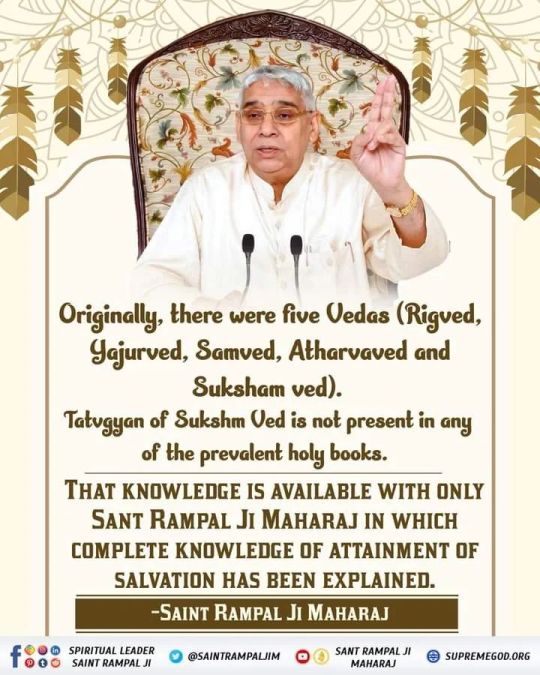
#Wayofliving_Part169 “Which God should be worshipped” according to Gita || Part-E God-loving Readers! This proves that the Tatvgyan through which Param Akshar Brahm is attained is not in the Holy Book Gita. Gita is a concise form, summary, of the four Vedas (Rigved, Yajurved, Samved and Atharvaved). This proves that the Tatvgyan of Sukshm Ved is not present in any of the prevalent holy books. That knowledge is available with me (Sant Rampal Das). It is not available with anyone in the world. Question: - Are Shri Brahm ji Rajgun, Shri Vishnu ji Satgun and Shri Shiv ji Tamgun also not venerable as deities? These very gods are worshipped in the Hindu religion. The Hindu religious gurus and Shankaracharyas and others advocate worshipping these very gods as deities. They themselves also worship them. Your statements seem to be untrustworthy. Can you prove this in Gita? Answer: - The religious gurus of Hindu religion do not have knowledge of their own holy books. For instance, if a teacher is not aware of the content of the books of the curriculum, then that teacher is detrimental for the students. That teacher is not right. Similar is the state of the religious gurus of the Hindu religion. Evidence: - In Shrimadbhagavat Gita Chapter 7 Verses 12 to 15, the Giver of the knowledge of Gita has stated that whatever is happening from the three gunas (genesis from Rajgun Shri Brahma ji, preservation from Satgun Shri Vishnu ji and destruction from Shri Shankar ji), I am its cause, but neither am I in them nor are they in me. (Gita Chapter 7 Verse 12) Let us first prove that Rajgun is Brahma, Satgun is Vishnu and Tamgun is Shiv Shankar. 1. In Markandey Puran (published from Gita Press Gorakhpur, Keval Hindi, Sachitra Mota Type), on Page 123, it is written that Brahma, Vishnu and Mahesh are the main powers of Brahm. These only are the three Gunas; these only are the three gods. 2. In Shri Devi Puran (published from Shri Khemchand Shri Krishna Chand Venkateshwar Press Mumbai), Third Skand, Chap- ter 5 Verse 8, it is stated that: - Yada dayadramna sada Ambike katham ahaM vihitH TamogunH KamaljH RajogunH katham vihitH ch Shri HariH SatgunH (Devi Puran 3/5/8) https://www.instagram.com/p/CczGjcGpZhV/?igshid=NGJjMDIxMWI=
0 notes
Text
How different religions explain death/grief & Dual Process Model of Grief
First of all, I am not making a research on distinguishing different religions, so I wouldn’t make a form and see how different religions answer the same question. The information below is just what I think it interesting to learn from kinds of aspects:D
1. Buddhism
Question: “How to explain the grief in our life?”
Basically, the point is “impermanence is fundamental to everything and existence is always in flex. ”Therefore, Buddhism believes that our attachment to things and failure to accept impermanence is at the root of our suffering.
The suggestion is: Stop trying to restore the old life and self that we suppose to be real. Just focus on the present and accept we are fundamentally changed. Everything is changing including the pain itself.
Reference: https://whatsyourgrief.com/grief-and-buddhism-comfort-in-impermanence/
Specifically, they suggest mindfulness and meditation. It’s called White light visualization. I think that’s a good inspiration about “body”.
“Sit quietly, take three breaths and on the out breath, imagine that you are releasing all the day’s busyness and worries, your anxieties about future commitments, your thoughts about past events. Let them all go, dissolving into the air. When you are calm, imagine that all the goodness in the universe manifests as a brilliant white light about two meters in front of you. The light is very bright but somehow has a peaceful and healing feeling. Its rays radiate in all directions. Imagine a ray of this white light enters your body at the crown of your head, filling you with healing light and purifying your body, speech and mind of all negativity. The light moves down through your body, pushing ahead of it your negativities and pain and suffering which leaves from the lower parts of your body as thick, black smoke that dissolves and completely disappears. Imagine now that you are completely purified, clean and whole and at peace. Remain in this state for a few minutes. Think, “Just as I have purified my body, speech and mind, so may all living beings be purified and find natural great peace.”
Reference: https://www.hayagriva.org.au/wheel-of-life/loss-and-grief/
2.Christianity
Question: “How to explain the death in our life?”
Answer: If there is death then we would think of them as going back to where they belong being next to god in heaven. Because whatever happens during life it’s just a journey to god. So if someone we love died we hope one day we will see them again in heaven. And suppose they will be living happily with god, looking at us.
The suggestion is: Accept the grief, don’t fight it, don’t deny it, don’t wall yourself off from other people. Just let the pain makes its way through you. It’s a blessed pain and it means you are a healthy individual.
Reference: https://www.christianitytoday.com/iyf/faithandlife/blessedare/hope-for-grieving.html
There is a Christian way to express grief. They feel sadness without hopelessness.
“Christians experience grief but without despair, sorrow but without defeat, sadness but without hopelessness. It’s true sorrow and true hope. These things don’t cancel out one another. We feel the great weight of sorrow and the great thrill of hope. In moments of deep sadness, we feel both.”
Because Christians grieve temporarily, they believe grief will come to an end.
Reference: https://www.challies.com/articles/how-christians-grieve/
3.Hinduism
Question: “How to grief?”
There is a 14-day grieving period about some rituals in Hinduism. “Its been believed that deceased soul lingers around on earth for 13 days. and slowly it gets its astral body and only after that it can move towards Yama Loka on 14th. (Where deceased souls would go)
So 14 day there are many rituals which is like “saying Goodbye” to that soul officially.
Now a days 14th day ritual are rarely done and 13th day ritual is called “Vaikuntha samaradhane”. That’s the end of most of rituals now a days.
13 Brahmins will be called and upon finishing rituals there were fed first before doing the Shradha. After the Shradha rituals all guest are fed lunch. Many kind of Dana were given that day, like 9 type of legumes, book, milk, cloths, cow etc”
Reference: https://www.quora.com/What-is-the-significance-of-the-16-day-grieving-period-after-death-in-Hinduism
Hinduism believes in rebirth and reincarnation, and they have a theory about where souls go.
“The Bhagavad-Gita describes two paths along which souls travel after death. One is the path of the sun, also known as the bright path or the path of gods and the other is the path of the moon, also known as the dark path and the path of ancestors. When a soul travels along the path of the sun, it never return again, while those which travel along the path of the moon return again.”
They also believe that if a people commit suicide, their soul will end up in a nether region called Punnama, which is a very bad consequence. However, ritual suicide was permitted under extraordinary circumstances.
“Through self-immolation, ascetics would discard their frail bodies in search of liberation. The body was considered a karmic fruit and burning it away at the end of a prolonged self-purification process was considered a good option to resolve past karmas. Some wasted away their bodies through severe austerities and diet restrictions, while some literally offered themselves to the elements such as water and fire and ended their lives.”
That’s also a special theory about “body”.
Reference: https://www.hinduwebsite.com/hinduism/h_death.asp
The Dual Process Model of Grief
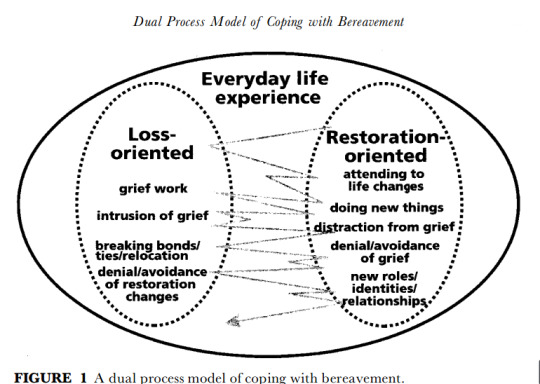
This model mainly that argues that to “avoid, deny, or suppress” certain aspects of grief is not only normal, but a healthy and important part of grieving.
“ ‘grief work’ is the general idea that a griever must work through their difficult and painful feelings around the loss. Those who subscribe to the ‘grief work’ theory argue that a griever will not recover from their loss if they do not go through this process, often tasks and stages, to confront their difficult emotions... This is a dynamic process that is actually part of the healthy grief process under the DPM, coping with our grief at times and seeking respite at times.”
Therefore, it’s OK to experience grief in does. At times you will face your loss, other times you will focus on fulfilling practical needs and life tasks and once in a while, you need to take a break. It’s about self-care.
It’s interesting that some comments mentioned “emotional bank balance”, and I think that deserves exploring. It may be able to come to a final artwork.
Reference: https://whatsyourgrief.com/dual-process-model-of-grief/
Cokay from Group 13
1 note
·
View note
Text
How so? If you do not believe it justifies war and killing, explain why. You must use quotes from the text to support your answer in either case.2.“Dharma” is a key term for understanding the Gita,” says Gavin Flood and Charles Martin in the Introduction to your edition of The Bhagavad Gita
How so? If you do not believe it justifies war and killing, explain why. You must use quotes from the text to support your answer in either case.2.“Dharma” is a key term for understanding the Gita,” says Gavin Flood and Charles Martin in the Introduction to your edition of The Bhagavad Gita
These prompts require that you have watched the video in this week’s folder, “Invitation to World Literature – The Bhaga-vad Gita.” :You must also read all of The Bhaga-vad Gita.:https://www.worldhistory.org/Bhagavad_Gita/Answer BOTH parts (A and B) and answer question number 2. Your post should be about 200 words, two paragraphs, and should contain details and at least one quote or paraphrase…
View On WordPress
0 notes
Text
These prompts require that you have watched the video in this week's folder,"Inv
These prompts require that you have watched the video in this week’s folder,”Inv
These prompts require that you have watched the video in this week’s folder,”Invitation to World Literature – The Bhaga-vad Gita.” : (click the blue button to see the video!)You must also read all of The Bhaga-vad Gita.:https://www.worldhistory.org/Bhagavad_Gita/Answer BOTH parts (A and B) and answer question number 2.Your post should be about 200 words, two paragraphs, and should contain details…
View On WordPress
0 notes
Text
These prompts require that you have watched the video in this week's folder,"Inv
These prompts require that you have watched the video in this week’s folder,”Inv
These prompts require that you have watched the video in this week’s folder,”Invitation to World Literature – The Bhaga-vad Gita.” : (click the blue button to see the video!)You must also read all of The Bhaga-vad Gita.:https://www.worldhistory.org/Bhagavad_Gita/Answer BOTH parts (A and B) and answer question number 2.Your post should be about 200 words, two paragraphs, and should contain details…
View On WordPress
0 notes
Text
All the World's a Stage
"All the world’s a stage, And all the men and women merely players; They have their exits and their entrances; And one man in his time plays many parts, His acts being seven ages." -- William Shakespeare, As You Like It, II, vii, 139
A play was in progress in India. Actor and dramatist Girish Chandra Ghosh (1844–1912) was playing the role of a drunkard and profligate. In one scene he was required to abuse a woman. His acting was so vivid and natural that a man in the audience, intensely infuriated and stirred, threw his shoe at the actor. It struck Girish and rebounded on the stage. Girish immediately picked it up, placed it on his head, bowed to the audience, and declared that he had never received a more gratifying tribute.
What happened to that man in the audience has probably happened to us all. The play of creation has been going on from God-knows-when. We were supposed to be watching it and enjoying it. At some point in this cosmic play, we probably got so involved in it, so identified with the characters and events in the story, our response was so strong and so quick, that before we knew it, we had already left our seats and found ourselves on the stage, becoming a part of the story ourselves.
When exactly this transition from being a “spectator” to being an “actor” occurred we do not know. We stopped watching the play at some point and began acting in it. We became immersed in our roles to such an extent that we even forgot that we were only actors. We became one with the characters we were playing.
This is, of course, the hallmark of all genuine actors. They forget their real identity and become one with the role they are playing in the story. When the story requires the character to shed tears in a tragic scene, good actors don’t need to smear glycerine under the eyes. Their body and mind, their entire being, becomes so attuned to the role, that tears and smiles come naturally to them. On this stage of the world, we too have become excellent actors. We laugh, we smile, we grieve, we suffer, we hate, we love, we fear. We do all of this, and more, naturally and effortlessly.
When the play is over, all actors regain their identity. When this play of creation is over, we too will regain our lost identity and know who we have always been. Not that every one is eager for the play to end. Many don’t even know that it’s a play. Some have heard that it is, but don’t really realize what it means (Kaṭha Upaniṣad, 1.2.7). Among those who believe it, some are terrified by the idea. But a few have had it. They just want out. For them, the question of questions is: when is this play going to end? If we are thinking “death” may be the answer, we need to think again.
Death does not end the play. The curtain rings down only for a while, and soon we have to get ready for the next act, perhaps for a different role, in a different costume, in a different makeup. The story continues with little variation—a few tears and a few smiles, with a liberal sprinkling of love, hatred and jealousy—like the soap operas, full of stock situations and the usually predictable storylines.
If this play of creation does not end with death, when does it do so? Alas, it never does. It just goes on and on, without ending. It’s being enacted on a revolving stage, one scene following another without respite. Now that we are already somehow entangled in this play of creation, when can we realistically expect to be free? Is there any hope that the play will end someday?
There is always hope. The play can go on—who cares?—but there is no reason why I should. The problem is that, so long I continue to be a “good” actor, I cannot get out. Will the director ever let go of good actors? They will be held back one way or another. But in the case of bad actors, the director is only too eager to dismiss them. As soon as a suitable substitute is found, the director shows the door to the bad actor. I know now what I need to do to get out. I must stop being a good actor and learn to act badly.
Is it possible to consciously practice bad acting? I think it is possible. Suppose a rich man is required to play the role of a beggar. Would his acting be natural if he is not able to forget that he is really rich but only playing at being poor? If an actor, miserable in her real life, is asked to play on stage the character of a cheerful woman, would she able to do it well if all the while she remains conscious of her personal woes? The actors who cannot forget their real identities while acting are bad actors. Their acting lacks spontaneity and authenticity. They have no future in the acting world. Sooner or later they are forced to quit.
If I really want to quit from this play of creation, I must become a bad actor. That is the only way out. When I consistently dish out bad performances, the director of this cosmic play—who else but God?—will, I imagine, gently whisper in my ears, “My child, go and sit among the audience. I cannot use you anymore. You have lost your ability to act. The only thing you are fit for now is to watch this play.” While this seems like a dismissal, it is in fact a reward.
Oddly enough, in this play of creation, it requires tremendous effort to become a bad actor, and hardly any effort to be a good actor. (Try writing a sentence with every word spelt wrongly. That needs more effort!) To get out now and dissociate myself from the play appears impossible unless I try real hard to make myself unfit for it. The only way to become a bad actor is to remind myself incessantly of my real identity, and to consciously detach myself from the role I am playing. I must remember always that all this is only a play, not real. I am reading fiction, not living history. I am not the character I have been dressed up in. I am someone different.
I learn from Vedanta that I am not the body, not the mind, not the intellect. I could say that they belong to me, but I am not any of them. I am different from them. The ātman—or pure awareness—is the real me. The body and mind are, at best, only coverings over me. What is my true nature? I am free, ever-pure, without birth, without death. I am being, consciousness, bliss absolute. I have never had any birth, nor will I ever die. I am free and infinite. (Gita, 2. 11–25)
All of this sounds too ridiculous to believe—and too disorienting to be told that I am not who I’ve always thought I am. It’s too scary to feel that I do not know who I am, but that seems to be the message. I have been so much absorbed in acting in this play of creation that I have forgotten my real identity. When and how did I forget this truth about myself? The Gita addresses this subject of loss of memory (smṛti-bhraṁśa) and traces its cause and its effects (2. 62-63), and recommends practices to help recover the lost memory.
When the quality of my acting in this play of creation starts degenerating, that is to say, when I am reminded again and again of who I really am, I become incapable of responding fully to the fictitious character I am supposed to be playing. I can no longer play a human being because I find it difficult to forget that I am divine. That’s the time for me to quit the stage. Sri Ramakrishna said,
“If a boiled paddy-grain is sown, it doesn’t sprout. Just so, if a man is boiled by the fire of knowledge, he cannot take part any more in the play of creation” (Gospel, p. 668).
I have to become “boiled” by the fire of knowledge—which will burn to ashes my false self and reveal my true identity. I will then remain absorbed in my real self (ātman). My duties as actor will be over (Gita, 3. 17). Once again I’ll find myself among the audience.
All who have attained enlightenment in this life are the audience. They are watching and enjoying this play of creation. Those who are absorbed into the play and are playing their roles to perfection are the actors. They can’t choose their roles but they can, if they wish, quit acting. No one is forcing them out. But if they want out, there is a way to get out.
Let the play go on. Once I am in the audience, I am free from the obligations and compulsions of acting. If I want, I can sit and watch the play. If I get tired and find it boring (as I eventually will, everyone does), I am free to walk out of the auditorium for ever. No rush. I can take my time. I am free.
0 notes
Text
Who decides ?
Yes, day 2 was missed but i wasn’t busy at all. It happened due to my laziness. yet, it is not that i didn't do anything at all during the whole day. my day began with a “why” and ended with an “oh, that makes sense”.
Throughout the day I was thinking about "who decides our 'karma'?". is a person really responsible for his/her deeds? who makes sure that a person follows certain lifestyle? As per Gita, our “Karma” decides our fate. But who decides our karma?
The answer is quite debatable but the most satisfying answer i could find, was our “upbringing”. Yes, a person’s upbringing decides his karma and fate. With the help of science and common sense we know that when a child is born, it is “shunya”. it doesn’t have anything except the body parts. it is us who give it it’s name,religion,address, an identity, and so on..The child is like a blank Computer, we add operating systems according to our ease ( mostly we install whatever we got, e.g., religion). the child questions everything, parents or guardians answer as per their understanding of the world. they make it do things that they were following since they were a child themselves. till the age of 12-13 years parents/guardians control their child in a way. understanding of a child is absolutely connected with what kind of environment he is brought up in. till a kid reaches the age when he/she can see the world through his/her own eyes, He/she is already filled with concepts taught by their parents. he is kind of habituated with the concepts he/she has been taught.
For example, A person who grew up in the middle class family has more value of money than a person who grew up in a rich family, because the middle class boy was lacking money during his childhood. The lack of something increases it’s value.
Similarly, an orphan kid would value relations more than the boy who grew up in a joint-family.
Hence, this thinking of a person decides his actions, And his actions decide his fate. but think really: Who decides our thoughts? Us, or the “upbringing"?
0 notes
Note
Ok this is probably going to sound really dumb, but what are the religious texts that are actually practiced in Hinduism? I can't seem to find straight answers anywhere; Thanks!
Q : what are the religious hindu texts practiced in hinduism?
ANS : OK.So,there are no particular “ religious texts practised” in hinduism.Firstly there are innumerable religious hindu texts ,all of which hold equal importance to a hindu & are practised at different points in a hindu’s life for varied reasons.They preach you on the different aspects of life.They contain the solutions to many hard-faced questions of life : the ideal way of living is explained,how does a man attain inner peace & happiness is explained,the spiritual austerites performed to reach god etc and many more are all explained in detail in innumerable hindu texts so ancient ,that many of them have not been dated by historians themselves.But that said : there are a few major hindu texts that most hindu’s are aware of and also follow their teachings:
1.BHAGAVAD GITA - THE HOLY SONG OF GOD
2.VEDAS - ANCIENT HINDU TEXTS
3.UPANISHADS - CENTRAL PHILOSIPHICAL CONCEPTS OF HINDUISM
4. PURANAS - BHAGAVATA PURANA,DEVI PURANA,GARUDA PURANA (also part of the vedas)
these are a few to name .
We hope you find our answer helpful.
THANKING YOU FOR YOUR QUERY ,
TEAM ~ ANCIENT HINDUISM
17 notes
·
View notes